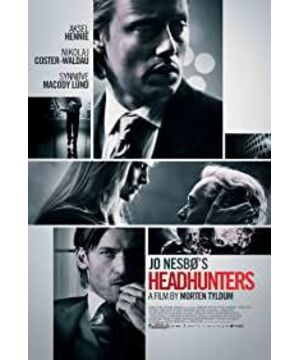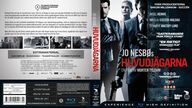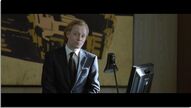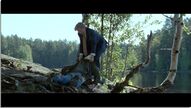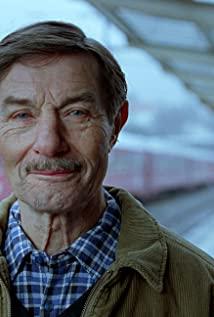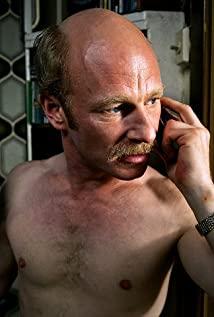Among them, the escape process is compact and exciting, which is very eye-catching, and the twists and turns at the end also make people a little overjoyed. The ending of the husband and wife returning to the old good together and moving forward is certainly in line with people's expectations, but the presupposition of the plot is too strong, the artificial traces are too strong, and it is not enough to go with the flow.
The movie focuses on action and plot. Compared with European and American blockbusters, the action is not so intense, a little close-quarters fighting, a little crashing and falling off a cliff, perhaps to cooperate with the male protagonist's weak figure, always shooting at an emergency, killing the place of death one after another. Arup, his mistress Luo Ti and his stalker Koles, the pirate accomplice of the pirated painting, ends the play. The gun that killed Luo Ti was quite interesting. Seeing that she was about to stab her with a knife, Roger slipped the gun that was on his waist and slipped into his trousers before he could pull it out, so he shot from the front of the crotch where it slipped. "Laser". Because the escape process is a series of links, Roger's expressions of fear or sadness are in place, and the audience will not pay special attention to whether the movements are rough or simple. However, it has to be said that the plot has a lot of flaws. If the main reason for Roger's continued stealing is his lack of self-confidence, the fear that one day his wife will leave him or that he doesn't love him as much as he is now, then Colles brutally hunted him down for the convenience of stealing trade secret positions The behavior setting of killing others together is not very reasonable, and this setting is the root cause of the movie's highlight escape and ending reversal. Also, why did Arup run to Roger's garage in the dark of night and accidentally hit the poison syringe that Roger had placed in the seat of the car before Corus started to hunt him down? When Roger was frightened and eager to destroy the corpse and rescued the poisoned Arup, he kept asking the latter what happened, but before he could get an answer, Arup was caught by him. Killed in self-defense, so the puzzle is over. As for the later police officers with damaged heads to replace the "dead" self, and the use of cameras to design the illusion that Coles and Arup shot each other due to internal conflicts, they were also handled very hastily. Don't the forensic doctor identify the body shape of the deceased, Blood type, DNA and other characteristics, don't you check the time of death of the deceased? Regarding the latter point, the play alludes to the well-known detective policeman deliberately covering up, but is this really feasible in legal procedures? And Roger's connection of cause and effect is mainly based on the fact that several deceased were killed by guns held by Coles and Arup, which is a bit weak.
Also, the one, two, three, and four so-called industry rules that appeared at the beginning of the plot gave people the feeling of a professional thief, but in fact Roger's methods and means of stealing paintings were not complicated at all. To put it simply, it is to use the position to learn about the people who may have Tibetan paintings and their recent movements, and then contact Arup, who is working in the security position, to control the access control when he chooses a favorable time to enter the target's residence, and then sells and divides the stolen goods. From this point of view, the list of rules at the beginning is somewhat deliberate.
Some suspenseful settings and detailed descriptions are mostly used in the end, but they are not harmonious enough, and they also give people the feeling of being deliberately done. For example, Arup did not die of poison and died in his own home, which provided the possibility for Roger to wash off his dirt; a colleague of Roger's company ignored his cold desire to join his circle of life, and finally made a difference for him during that time. Disappeared and made a lie; Luo Ti pitifully posted his cold face after ending his relationship with Roger, and provided emotional support for him to go back to her after his death; the original applicant for the position of "Explorer" manager finally got the This position is also a kind of echoing happy ending.
At the end of the play, the male protagonist says that he understands human nature and appears to be full of posture, but from the perspective of the whole plot, it is not so conclusive. His hypocritical assertion of humanity derived from the painting on the wall when he received the first candidate for the position of "Explorer" (the painting with the better colors and brushwork became famous because its author's signature was not Because the painting itself is quite meaningful, it does not mean that he understands human nature very well. Judging from the following plot, his understanding of human nature is not deep enough, otherwise he would not be in the fog and have no reason for it, otherwise the plot It won't unfold like this. Therefore, it would be better to say that he has a certain understanding or knowledge of human nature.
Excluding the above-mentioned omissions, the main line that runs through this film, "Roger and Diana's emotional ups and downs" really infected me, of course, it is not unrelated to the deliberate depiction of slow motion and close-up shots. One is that when Roger successfully stole the "Russian painting" from Colles' apartment, he saw several children playing happily through the window. He remembered his wife Diana's longing for children very tenderly, perhaps fantasizing about it. After I decided to get rid of this painting, I and my wife could have several children like this one day. The second is that Roger managed to escape from death. After shaving his head and changing his clothes, he walked to a phone booth and dialed Diana's number. Diana guessed that it was him, but he did not answer, as if he just wanted to hear her voice. After hanging up the phone like this, a bright red blood flowed down from his bald forehead, and he reached out and covered it in a little panic. Another is that Roger stole home after learning about the cause of the incident from Luo Ti. When he saw Diana again, the silence and hug between the two were so natural, and the softly flowing music was so tender.
View more about Jo Nesbø's Headhunters reviews


